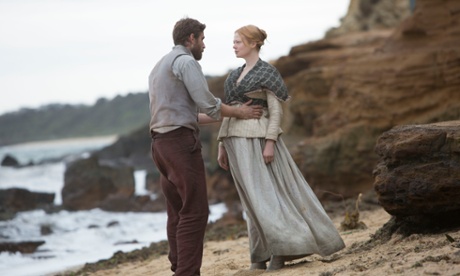
The Secret River is a two-part ABC television drama that tackles the chilling fundamentals of Australian white settlement: Europeans invaded, slaughtered the first peoples and stole their land.
It is excellent. It is important. It is courageous, confronting television.
But it comes two centuries after the events it depicts: settlement by British convicts and others along the Hawkesbury river in New South Wales and the inevitable, violent confrontations with the Dharug who had inhabited this idyllic place for thousands of years.
But now it’s 2015.
We’ve moved on.
Haven’t we?
We’ve got a prime minister, Tony Abbott, willing to “sweat blood” for a 2017 referendum to recognise Indigenous Australians in the whitefella constitution even though he reckons Australia was “unsettled or, um, scarcely settled” and the place was “nothing but bush” when the first fleet arrived in 1788.
Then there’s Noel Pearson, Australia’s most politically influential Indigenous voice urging first peoples to get over past traumas.
So why pick at this nasty scab? Why not leave it well alone as it has been for the past 200-plus years?
There are many good reasons. Not least is that by learning what happened we might understand how the legacy of extreme violence, dispossession and oppression manifests in an Indigenous Australia where some of the world’s worst social, economic and health disadvantage remains shamefully extant. The past aligns precisely with the present in today’s Aboriginal Australia, to the inescapable discomfort of the non-Indigenous.
By learning more, we can celebrate the enduring cultural richness of one of the world’s oldest peoples. But there’s far too much room for despondency. People of my generation and older were not taught what happened. We stumbled upon it, felt compelled to dig and expose it. Yet we remain bogged in a cultural paradigm where for a week the media zeitgeist was a debate over the propriety of Adam Goodes throwing an imaginary spear at Carlton supporters during the AFL’s “Indigenous round”.
Good art challenges preconceived cultural narratives regardless of client discomfort. Indigenous artists have been depicting hostile frontier settlement and war since it happened, while early post-colonial white writers including Barbara Baynton, Katharine Susannah Prichard, Eleanor Dark and Stella Miles Franklin focused on the brutal realism of frontier life regarding Aboriginal people, settler women and children.
Based on Kate Grenville’s superb Booker prize-shortlisted 2005 novel, The Secret River has the potential to enhance debate. It evocatively tells one story from the war on the frontier – that of convict settler Will Thornhill (Oliver Jackson-Cohen), transported to Australia for the term of his natural life for theft, and his wife, Sal (Sarah Snook).
There is no sugar–coating of life at Botany Bay under the rum corps, where convicts along with the local blacks are treated like animals. Will, thanks to the persistence of Sal who has followed from London with their boys, is released and eventually pardoned. While in the penal settlement, Will and Sal are warned the Indigenous inhabitants of the Hawkesbury are “not like the blacks round here – they’re too drunk to throw a spear”. They settle on the hundred Hawkesbury–fronted acres Will believes will ensure his freedom from British shackles.
The director, Daina Reid, and the screenwriters have superbly adapted the characters to illustrate the complexities in this microcosm of the broader frontier war story. Sal and Will are initially cautiously disposed towards the Dharug, whose leader Greybeard (Trevor Jamieson) tolerates the settlers who naively dig up his yam daisies, shoot his kangaroos and chop down his trees to build a house. To a point.
“Bugger off – this is my place now,” Thornhill yells in one of the most resonant lines of the series.
Earlier the Hawkesbury settler Thomas Blackwood (Lachy Hulme) has made it his business to understand the Dharug. He coexists with the blacks and is determined to instil a greater understanding among fellow settlers.
Easier said than done when it comes to the hard-bitten Saggity (Samuel Johnson) and Smasher Sullivan (Tim Minchin). Minchin – musician, writer, comedian – lends a sinister malevolence to Sullivan, a former convict from Northern Ireland, dehumanised by the lash and determined to snatch whatever he can from the land and its first people. Those who are unaware of the worst excesses of soldier/settler behaviour will dismiss Smasher as implausible. But this character resonates because I know him to be so horrifyingly true: not only does he consider killing a black akin to “shooting a dog”, he keeps an Aboriginal woman chained as his sex slave and participates in the sale of Aboriginal body parts.
The blacks continue on their land as always. They steal the settlers’ crops and mock Thornhill in his fury. When a settler is speared, retribution is swift and disproportionate. This is difficult to watch but it is a painfully accurate rendition of the truth intrinsic to countless similar massacres across the colonial frontier until well into the 20th century.
Finally we’re left with an older Thornhill still on his Hawkesbury estate. He’s still there. And you can think but one thing: Thornhill – like every other squire across this wide brown land – inhabits someone else’s land. And the next questions logically follow: how did that come to be and was it the same everywhere?
Pearson urged Indigenous Australians to get over their traumatic history as the Jews had done with the Holocaust. It must be said, the world has, rightly, been reckoning with the Holocaust since the liberation of the concentration camps.
Australia has had no such reckoning.
But it is coming. And The Secret River series will be, like the novel, central to that.

